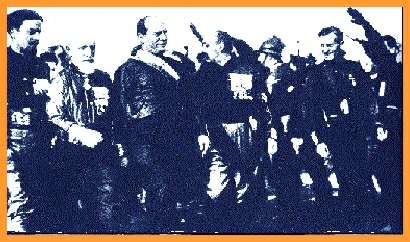|
5.3 Fascism in Italy
In 1939, Hitler asserted that Fascism succeeded in saving
Italy from Bolshevism. To an extent, Fascism in Italy was an answer to
the communist threat posed by Russia. Italy belonged to the group of Allied
powers who were victorious in the World War of 1914. Still she did not
get the facilities that she deserved. She was disillusioned and a sense
of discontentment prevailed in the country. Due to this fact the economic
conditions of people in Italy worsened and revolutionaries found a suitable
opportunity to create chaos in the nation. At that time the government
was incompetent. It failed in taking control of the conditions in the
country. Gradually the nationalists grouped together to emerge as the
Fascist party. According to Ketelbey, author of the book History of
Modern Time Europe, "It was this urgent need of a strong unifying
force that formed the background for the rise of Fascism in Italy."
The rise of Fascism is unprecedented in the History of
Europe and in the world at large. Mussolini led the Fascist party. He
acquainted people with the basic tenets of Fascism. About 15 months before
the Fascists gained power, Mussolini wrote, "To say that there still
exists a Bolshevist peril in Italy is for interested motives, to substitute
fears. Bolshevism has been vanquished."

Exhibit 5.5
A war photograph of Mussolini with his troops
An eminent Italian historian gives a very different picture.
He says that although there were disturbance, riots and strikes in pre-fascist
Italy, there was never a breakdown in the economic machinery of the country.
According to an Italian economist, Italy had decidedly improved her condition
at that time, and the lives of Italian people, on the economic front,
seemed to recover. So to say that Fascism arose on account of either chaos,
especially on the economic front would not be correct.
Benito Mussolini in the early days of his life pursued
varied careers, as a schoolteacher, a mason, a farmer, a blacksmith.
When he went to Switzerland for higher studies, he came in contact
with socialist propaganda. He returned to become an editor of a
socialist newspaper in Italy. He served in the Italian army for
some time and later organized a Fascist group of fighters (fasci
di combattimento). Its basic idea was the promotion of the Rightist
ideology and the destruction of the leftists. The main aim of the
group was to govern the nation and ensure the moral and national
greatness of the people of Italy. The objectives of Mussolini were
twofold. He attempted to strengthen the authority of the state and
encouraged natural syndicatism.
The Fascist group was instituted at Milan in 1919. This
movement soon spread to other towns and then penetrated the villages too.
The members of the organization were mostly the recruited from among combatants
and students. They wore black shirts as their common dress which reflected
their uniformity. By organizing the labor unions i.e. the syndicates,
Mussolini won many socialists to his fold. The objectives of labor unions
were that they be given control of industries, that a capital levy and
an inheritance tax be installed and that there be an eight-hour work day.
Mussolini ordered a mobilization of the army of the Black Shirts. Together
they began their March on to Rome. The king of Italy invited Mussolini
to form the ministry.
Fascists were anti-democratic, anti-individualist and
also anti-socialist. They also declared that political factors make history
and not the economic factors. Fascism was also against laissez-faire and
pacifism. Instead it exalted war.
Mussolini had ambitious ideas of expanding the borders
of Italy. This began to alarm Europe. When the Second World War broke
out, Mussolini hesitated to enter into the fracas. Later the temptation
to take quick and easy spoil proved irresistible to him. Italy waged war
with Britain and France and gained easy success. This encouraged him to
make an even a bigger attempt on Egypt and Greece and also North Africa.
But he failed in this attempt. Due to this, Fascism was shattered. Mussolini
was murdered in 1945. What Italy gained in the war was lost during the
peace treaty. According to Hazen, an eminent historian, "Fascism
began an impulse towards law and order and it sought to safeguard the
existing institutions of Italy against the ruinous influence."
[next page]
|
Index
5.0
Introduction
5.1 The Russian Revolution
5.2 NAZI Germany
5.3 Fascism in Italy
5.4 The Second Great War
5.5 Impact of the Second Great War
5.6
The Establishment of the U.N.O.
5.7 Points
to Remember
Chapter 6
|